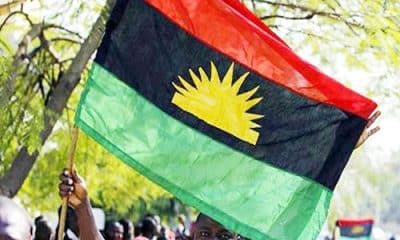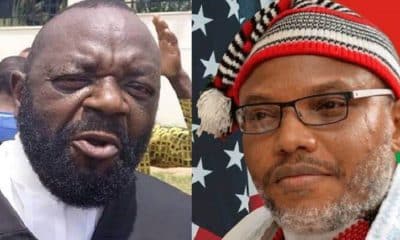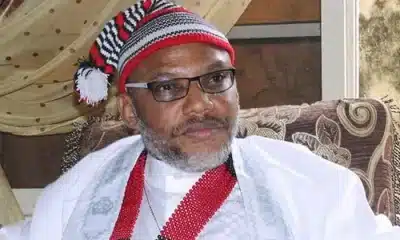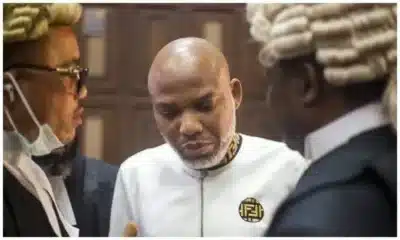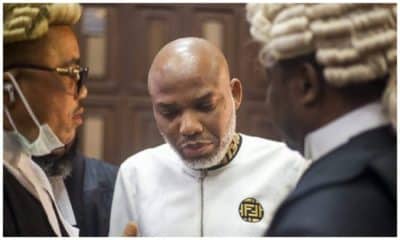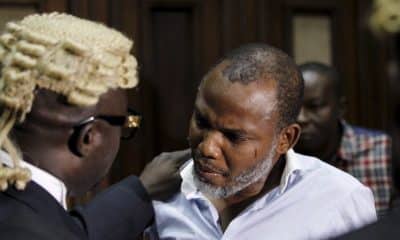Opinion
Why I do not agree with IPOB
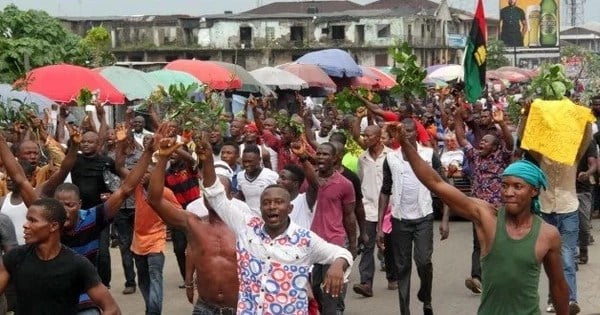

Pius Utomi Ekpei/Nigeria News/Getty Images
President Muhammadu Buhari’s adventure in power has made Nigeria a more divided nation than he found it and watered the grounds for serious dissent right from the get-go. The president could most certainly have started on a very different note. He could have centered himself quickly as a unifying force, a statesman with a mission to heal the nation, after years of the trauma, from military rule, of which he had been a serious part, to a civil rule characterized by the corruption and violence of the Obasanjo government, and the confusion and mediocrity of the Jonathan administration.
The elections were hard fought and he won, with a coalition that was made of the bulk of parties that had fought the PDP behemoth from 1999. Buhari received great support from the North, and enough from the Southern states to elect him as president. That should have been enough basis for him, even if he received the least support from the East, to make a statesmanlike gesture of conciliation, and unity; to get the nation working, and as the APC did promise, to “hit the ground running.” Dr. Goodluck Jonathan was magnanimous in defeat, and in conceding to the larger wishes of the population, although the votes showed that he was not roundly trounced. His civilized gesture ought to have set the tone for the Buhari presidency. But that was never to be. Buhari came to office dawdling. He learned nothing from his stint as Military Head of state apparently, about the complexity of Nigeria; and about the fact that no part of Nigeria ought to be taken for granted; and about the fact that Nigeria’s greatest resources are its human resources, and for any president to be successful in Nigeria, he or she must acknowledge the place of every part of this nation as equal stake holders to the fortunes, and even the misfortunes of the nation.
Buhari is singing new tunes, it does seem, now. His visit last week to the East has been seen in certain quarters as a gesture of reconciliation with the South East which has staged the most persistent opposition to his presidency. Buhari made the right noises in the East. Some say, well, his return from the brinks of death, following his serious medical situation had given him his “hail Mary” moment, and that like Saul, he has been on his own road to Damascus. Some say his visit to the East, and his promises last week to be more inclusive of the East may be a new Buhari, who probably has seen that what cured him in London was not God, but well-trained doctors doing cutting edge medicine with purely scientific means, in well-equipped, well-manned facilities. Nigeria’s greatest resource is the abundance of wasting talent, a lot of it in the East, and for as long as the governments of Nigeria continue to limit the possibilities of these Nigerians, this nation will continue to experience needless poverty, needless death, and needless crisis and dissent. Even then, many more are still skeptical about Buhari’s visit of conciliation to the East. They think it is a mask. Two presidents before Buhari, Yar Ardua and Jonathan, saw the dangers of political brinkmanship, and chose to be conciliators and statesmen. But here is the problem: people are no longer talking about a “common Nigerian good.” We have all regressed into our small, quiet corners. There is profound anger riding on profound ignorance in the land.
President Buhari should publicly accept that his actions led to the rise of the radical phase of the dissent movement in the East, led now by the group, IPOB. And I disagree fundamentally with IPOB’s cardinal mission to dismantle the federation of Nigeria. I want to be very clear about this: I do not disagree with IPOB that Nigeria is a fundamentally fractured, unhappy and dissonant place. It is that, and more. What I disagree with is that it needs to be permanently unbundled with each “ethic nationality” going its separate way.
IPOB’s claim that separation from Nigeria would guarantee Igbo prosperity, coherence, and progress rests on their belief that Ndi Igbo are egalitarian people who established a republican system older and more ancient than Greece. The ancient Igbo republican ideas with its ethos of hard work, toleration (onye na nke ya), meritocracy, innovation, Justice and forbearance(encoded in the “Ofo” and the “Ogu” principles), and its value for the sanctity of life (under the principle, “Ndu-Bu-Isi”/ “Ndu-Ka-Aku”), of equality, equity, individual freedom, liberty and an abhorrence of the rule of Kings – everything which made the Igbo unique and adventurous and daring – have been severely corrupted with its contact with her feudal and monarchical co-nationals, whose feudal and monarchical culture have created the “the Oga-at- the top” culture which clashes with the Igbo, “Di anyi” culture. In other words, Igbo secular humanism and its value of the equality of the individual is clashing with the spurious, and deadening hierarchies of those who claim to be “born to rule,” in a modern nation that ironically privileges “rulers” on one side, and sidelines the “commoners” or “peasants,” on the other side.
IPOB claims that this is why we now see increasing inequalities, with the so-called “ruling class” seizing the commonwealth of Nigeria and strategically impoverishing those it calls the “ordinary Nigerian.” IPOB claims it can no longer stand by and watch the strategic “peasantification” of the Igbo among these “common Nigerians” since there is, historically, no “commoner” among the Igbo. All men are born free to their land, and are “Diala” and women, “Mgboto” or collectively, “Umuada” – no commoner, no peasant. Even men of title are first of all, citizens (“Diala”), as their titles confer only symbolic significance rather than political power or rights to them. IPOB thinks that it can restore Igbo humanism in a free and separate country called “Biafra” built on Igbo values of equal citizenship. IPOB believes that Nigeria has made it structurally impossible for the Igbo to thrive under a common citizenship with the rest, given what its members perceive to be the widespread fear, hatred, and suppression of Igbo industry across Nigeria, particularly in the North of Nigeria, the result of a cultural difference.
In IPOB’s mind all Northerners are “Islamic fundamentalists” or “Boko Haram” fighting to “Islamize” a fundamentally secular, and religiously, “Christian Igbo.” Buhari of course only came to prove IPOB’s anxieties correct. IPOB believes that the older generation of the Igbo wasted their time fighting for justice for the Igbo in a united Nigeria, but that the Igbo, for as long as they remain in Nigeria will never get justice; will be incrementally sidelined; that other parts of Nigeria will always band against the Igbo at the drop of the hat; that the only thing that unites Nigerians, a fractious mix-bag of nations which IPOB calls ” a zoo,” is their shared “Igbo problem;” and an ambition to dismantle Igbo capacity by containing Igbo energy in one spot, the South-East, with a concentration of power in central government where they have been increasingly sidelined, and which will determine Igbo historical condition and destiny permanently.
I agree that there are some really vital points of concern in IPOB’s ideological stance, but here is where I disagree with IPOB: one, the Igbo are not exceptional. They have contradictions like every group in Nigeria, and separation does not guarantee peace and prosperity.
The Igbo are the backbone of the modern nation of Nigeria, and the formation of Nigeria therefore is an Igbo project. Igbo artisans and laborers built the rail lines that crisscrossed Nigeria, North and South, and wherever they stopped, they settled as railways clerks, locomotive drivers, artisans, teachers, traders, chemists, doctors, postal clerks, and built the townships that have become the great Nigerian cities today. This circulation of the Igbo is the meaning of the nation, and therefore, every part of Nigeria is Ala-Igbo today, and the Igbo must claim it. The Igbo cannot abandon this project at this crucial moment in its evolution.
The IPOB claims the Igbo have nothing in common with the rest of Nigeria. This is not exactly true: first, from an anthropological point, but certainly from a historical and sociological truth: Nigerians have more in common than they have differences. The cultural crosscurrents that have shaped Nigeria is from the mixtures of the ethnicities that have given it character as a new nation, and it is a powerful, and beautiful nation, beneath all that corruption. The Hausa of 1914 is not the Hausa or Berom or Yoruba or Edo or Fulani of 2017. Nigeria has a discernible national culture that comes from this interaction. Today, the Igbo is much more than the Igbo of 1914. The IPOB claims that other Nigerians hate the Igbo. There is truth that Igbo have been victims of hatred, but there is also the truth that there is another half of other Nigerians that love the Igbo, who have been allies with the Igbo, North and South, and with whom the IPOB must ally to fight for the universal transformation of Nigeria as a prosperous and just nation. They must ally and organize democratically, with their current fierce energy, and build strategic democratic alliances to establish Igbo values as the governing values of Nigeria.

